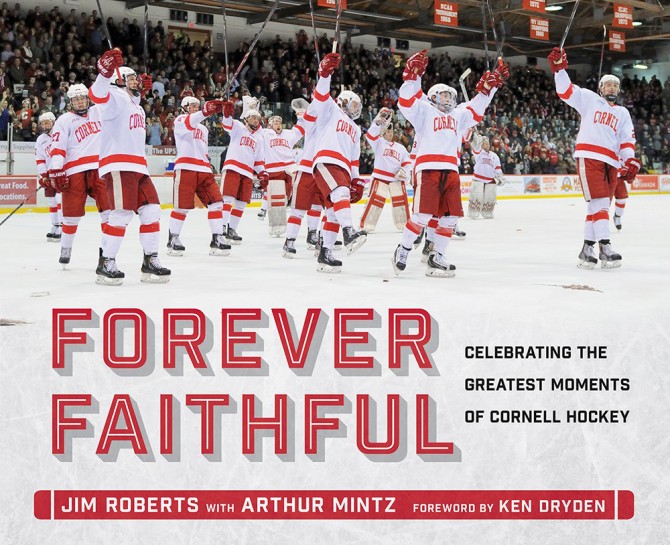‘Forever Faithful’ pays tribute to Cornell hockey
By Tom Fleischman
“Maybe most of all, I remember the fans. … The ones that went on the road with us, to Christmas tournaments in Boston or New York … They taught us a life lesson – always do what you do where it matters.”
– Ken Dryden ’69
Dec. 14 will mark the 60th anniversary of the first Cornell hockey game played at that venerable old barn, Lynah Rink. On that date, the Big Red men faced off against the Lehigh Club … and faced off … and faced off. Final score: Cornell 16, Lehigh Club 3.
It seems only fitting that, 60 years into what is widely known as the “modern era” of Cornell hockey, a book would be published to recall some of the greatest moments in the history of skates, sticks and pucks on East Hill, a history that includes prehistoric times – aka 1900 through 1947, when seasons ranged from one to 10 games long but typically fell somewhere in the middle.
Such a book has just been released – “Forever Faithful” (Three Hills, an imprint of Cornell University Press, $24.95) – and it’s a must-read for Cornell men’s and women’s hockey programs’ legion of fans. The book’s title is a nod to that storied group, known far and wide as the Lynah Faithful. Fun fact: They were almost going to be known as the Carpenter Faithful.
Author Jim Roberts ’71 – who got a big assist from classmate and longtime Lynah public address announcer and official scorer Arthur Mintz ’71 – takes the reader on a 117-year odyssey, from the program’s humble beginnings on the sometimes thin ice of Beebe Lake, through the starts and stops and starts of what would eventually become Lynah Rink, through the glory days of Ned Harkness and two national championships, to the current era of men’s coach Mike Schafer ’86 and women’s coach Doug Derraugh ’91.
Before all that, however, is a beautifully written foreword by the unofficial poet laureate of Big Red hockey, Ken Dryden ’69. An accomplished author and former member of the Canadian Parliament, the 6-foot-4 Dryden backstopped the first of those two NCAA titles in 1967, compiled an otherworldly Cornell career record of 76-4-1, and won six Stanley Cups in the 1970s as goalie of the National Hockey League’s Montreal Canadiens. Dryden, who turned 70 two months ago, strolls down memory lane in a love letter to Cornell hockey and its devotees.
Roberts and Mintz guide the reader through more than a century of hockey at Cornell. Early chapters include The Rink, The Fans and The Rivalries.
The bulk of the book, however, recalls 24 of the most memorable games in men’s and women’s program history and will be a fun read for fans, whether they were at the games or not. Reliving some of the most glorious moments from both programs’ past – the national championships from 1967 and 1970 (the latter capped what is still the only perfect season in men’s college hockey history at 29-0), the men’s and women’s ECAC Hockey title-game victories in March 2010, and many others – will be an excellent primer for the current occupants of Lynah’s student sections.
The book concludes fittingly with the “box score” – key historical statistics from the women’s and men’s programs – along with an epilogue and author’s note. And the book is loaded with pictures, many with the Faithful in the background, so if you look closely you may see yourself or someone you know within the book’s 280 pages.
Media Contact
Get Cornell news delivered right to your inbox.
Subscribe